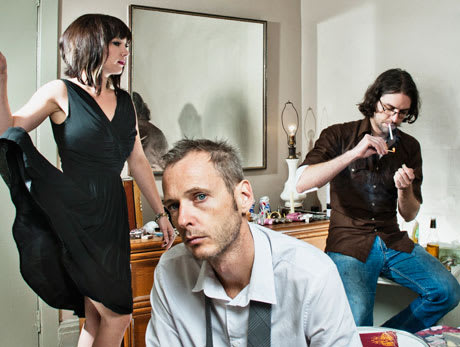Watching a great band evolve is fascinating and it's particularly compelling when it comes to Toronto's catl, a trio steeped in blues tradition yet refreshingly idiosyncratic. Spearheaded by Jamie Fleming and Sarah Kirkpatrick with new drummer/ex-Deadly Snake Andrew Moszynski, catl. gained notice for their roaring party of a live show ― a scrappy, reverent blues explosion reflected on three studio albums since 2008, including new scorcher, Soon This Will All Be Gone.
Fleming thrived in Southern Ontario's mid-'90s underground punk scene, as an electrifying guitarist/vocalist in Pecola. When that band dissolved, he seemingly vanished from public performance before having an epiphany. "As a kid listening to punk rock, I realized it didn't come from nowhere so I looked backwards," he explains. "If you follow the thread of rock'n'roll, a lot of it was derived from country and blues music. Pierre at [Toronto record store] Rotate This gave me a Mississippi Fred McDowell record and, listening to the way he made one guitar sound like a bunch of guitars and be a band unto himself, really intrigued me."
Fleming's musical trajectory is notable because the post-punk he explored in Pecola was awe-inspiring, sounding distinctly unlike their contemporaries. Now, even after winning a Toronto Blues Society talent contest a couple years back, he's doing the same thing in catl. ― usurping age-old conventions, sticking out from the pack, and fucking shit up.
"I found it really challenging to put myself inside the parameters of country-blues music and then try and work within that to make it interesting. It's like putting yourself in a cage, rather than having an open landscape with no structure. But I don't consciously go out of my way to make things sound drastically unreal or different. That's just the way I hear things and play."
Fleming thrived in Southern Ontario's mid-'90s underground punk scene, as an electrifying guitarist/vocalist in Pecola. When that band dissolved, he seemingly vanished from public performance before having an epiphany. "As a kid listening to punk rock, I realized it didn't come from nowhere so I looked backwards," he explains. "If you follow the thread of rock'n'roll, a lot of it was derived from country and blues music. Pierre at [Toronto record store] Rotate This gave me a Mississippi Fred McDowell record and, listening to the way he made one guitar sound like a bunch of guitars and be a band unto himself, really intrigued me."
Fleming's musical trajectory is notable because the post-punk he explored in Pecola was awe-inspiring, sounding distinctly unlike their contemporaries. Now, even after winning a Toronto Blues Society talent contest a couple years back, he's doing the same thing in catl. ― usurping age-old conventions, sticking out from the pack, and fucking shit up.
"I found it really challenging to put myself inside the parameters of country-blues music and then try and work within that to make it interesting. It's like putting yourself in a cage, rather than having an open landscape with no structure. But I don't consciously go out of my way to make things sound drastically unreal or different. That's just the way I hear things and play."
